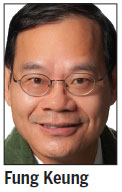Do not teach children to be materialistic
Updated: 2015-01-05 06:18
By Fung Keung(HK Edition)
|
|||||||||
A recent survey conducted by a major local Chinese newspaper reveals that Hong Kong primary school children are very materialistic. They equate success with money. Psychologists warn against parents indoctrinating their children with materialistic thoughts.
In an environment where many parents preach "money is everything" to their children, young people would dream of becoming rich and living in "luxury" apartments when they grow up. This is exactly what a recent newspaper survey has discovered.
Many a young child is scolded by their parents when they say they want to become artists or musicians. Invariably, their parents tell them to study finance or economics in university and become investment bankers. Their success will be measured solely by how much money they make.
While there is nothing wrong per se in letting children know they live in a material world, we should also teach our young the core values of our society: fairness, integrity, compassion, empathy and respect for others. Children should be groomed with these values, lest they make money or materialism their god.

Hong Kong people expect community leaders to be good role models by upholding Hong Kong's core values. Today, while the Christmas and New Year festive mood lasts, it is timely to quote the Bible, "Leaders in the church should be full of integrity (Titus 1:7)." Here in the local context, the church is referring to Hong Kong society: its leaders, including government officials and business tycoons.
This emphasis on integrity was apparent after three businessmen and a former senior government official were sentenced, days before Christmas, to between five years and seven-and-a-half years in prison. The money allegedly changing hands totaled tens of millions of dollars. The official concerned was a former chief secretary.
We should always remind ourselves that "Satan tempts us with material things (Matthew 4:8)". Indeed, the Independent Commission Against Corruption on Christmas Eve issued new guidelines for public employees accepting gifts. Public bodies refer to those 113 government-funded organizations that enjoy great administrative autonomy. They include the Housing Authority, the Securities and Futures Commission and public universities.
Previously, employees of public bodies could accept gifts up to HK$500 in value. The new guidelines stipulate that no employees can accept gifts even the value is below HK$$500 without prior approval of their superiors. Rules for civil servants were already tightened in 2013. The previous guidelines for public bodies were released in 2000. The latest revision has a section defining what "deferred benefits" mean and how these benefits might be seen as bribes. Government servants or public-body employees might do private companies favors when they are in office, in return for well-paid jobs when they retire.
Blatant cases of "deferred benefits" include several senior police officers. These well-known figures were employed by private firms as "security chiefs" when they retired from official posts at the age 55. They now bring home a few million dollars a year for doing virtually nothing.
The writer is a veteran journalist and senior lecturer at Beacon College, an English tutorial school.
(HK Edition 01/05/2015 page1)